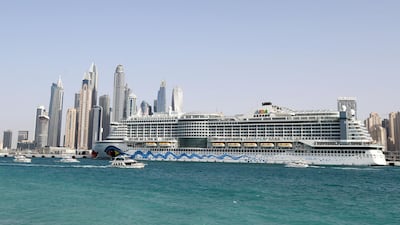When Covid-19 swept through the world last year, shutting borders and sending nerves on edge, it seemed for a while that the worst place to be was on vacation. And the worst kind of vacation to be on was a cruise.
To landlubbers, it may seem a distant memory now, but for weeks, scenes of cruise ships sailing aimlessly with infected passengers, unable to dock anywhere, frequented the world's television screens. Captains of the industry were rightly worried that the ensuing reputational damage would scupper their companies for good.
But this week saw the start of Dubai's first post-pandemic cruise season, with 126 ships carrying 500,000 passengers expected over the next few months. With the tide of the pandemic receding in many countries, cruises are coming back on line. And in a world that is more knowledgeable and more prepared for life with coronavirus, they may come back stronger – and safer – than ever.
At the industry's largest annual conference, held in Miami in September, cruise company executives made bold claims, insisting that they now provide the safest vacations available in a coronavirus-plagued world. The logic is straightforward: if stringent proof-of-vaccination and testing protocols are applied, then the insulated environment of the all-inclusive cruise is akin to spending a week or two on a sterile island. "We control the environment," said Richard Fain, chief executive of Royal Caribbean, one of the world's largest cruise operators.
For health experts, the proof that cruising is safe will be not just in the protocols employed on-board, but also at ports. In this respect, it will be critical for the countries vessels visit to be safe places to disembark. But many countries that were already investing in infrastructure to accommodate cruise holidays have also come out of the pandemic experience with an enhanced eye for safety. UAE ports, for instance, have implemented world-leading health and safety protocols for cruise ship passengers.
Of course, there are safer leisure options than a cruise, such as a solo walkabout in the great outdoors. But the pandemic has left many people fed up with isolation; leisure-seekers are keen to be social again. The term "all-inclusive" is sometimes off-putting to haughtier or more adventurous travellers, but there is no denying that for someone in need of hassle-free socialising, cruises really do have it all: pools, restaurants, sightseeing, sports and entertainment venues in one floating package.
It is no wonder that before the pandemic struck, cruises were the fastest growing sector within the travel industry. In the five years before 2020, global demand grew by more than 20 per cent, according to KPMG, an accountancy firm.
They were also becoming more affordable. In the 20th century, cruising was considered the height of luxury for most. The industry's larger vessels – still often called "luxury liners" – have retained the vestiges of that more opulent era, with formal dinners and an abundance of service staff still common. But the cost was declining significantly, from several thousand dollars a head to just a few hundred. Today, one Indian firm offers all-inclusives from Mumbai to Dubai for as little as $335.
The resurgence of cruising will not just benefit industry executives and holidaymakers. Cruise ships are a major source of employment – and remittances – for many developing countries. Prior to the pandemic, hundreds of thousands of Filipinos, for instance, comprised nearly 30 per cent of cruise ship workers. The remittances they sent home had grown by 70 per cent over the preceding decade. When Covid-19 hit, many of them became unemployed.
Translating the value of reviving cruising into real consumer confidence will be a challenging assignment for cruise operators' marketing departments. But if they can present the case well, then cruising looks set to make a real comeback. If it does, the economic – and recreational – benefits will make waves.


